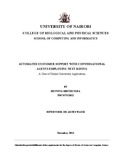| dc.description.abstract | The use of online information systems that can be and are accessed on a 24 hour basis has
continued to grow both locally and globally, these systems require available customer support at
all times. Customer support is services that assist customers to make cost effective and correct
use of products or services; it is divided into voice-based and non-voice based. Requests
received by support personnel are routine in nature and their numbers surpass the staff employed
to handle them hence organizations need to device mechanisms of automating customer support
to ensure available staff deal with requests that have been escalated due to their uniqueness as
opposed the routine ones; thereby enhancing productivity and reducing staff related costs and
improving the response times.
This study demonstrates automation of customer support, through design and development of an
automated customer support system that uses the online university application as a case study.
The system employs conversational agents (CA) which are computer systems that are intended to
converse with human beings. The demonstrated CA use classification algorithms specifically
Naive Bayes (NB) algorithm and Latent Semantic Indexing (LSI) to categorize the emails
received.
The developed application can process and respond to 500 emails in 3 minutes, while support
personnel can handle the same in approximately 5000 minutes, hence demonstrating its
applicability in possibly reducing staff costs and improving response times. A comparative
analysis of responses generated was performed on a subset of the sample support emails to
determine the accuracy of the application as compared to the customer support personnel. NB
algorithm was found to have an error rate of 88 percent while LSI was found to have an accuracy
of 74%. Further evaluation conducted on the algorithms resulted in LSI accuracy 0.89 and FScore
0.94 while NB accuracy 0.94 and F-Score 0.96. The study recommends that any future
studies to study the improvement of accuracy of the NB classifier and system enhancement to be
able to handle multi- part emails. | en_US |

